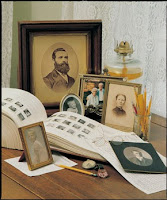PRELIMINARY SYLLABUS NOW Available--click here
2015 WORKSHOP SURVEY
CLICK here to complete
CLICK HERE to REGISTER ONLINE
ROOTS & BRANCHES 2015 WORKSHOP
Digging up Treasures in Your Own Back Yard
Local area Historical Societies and Museums
Local area Historical Societies and Museums
Virginia Hanson, State Historical Society--Keynote Speaker
Saturday, Sept 19, 2015, 8:30 am - 4 pm
TO DOWNLOAD/PRINT REGISTRATION FORM
Click here
sponsored by
Brookings SD FHC
See map below
Brookings Ward
The Church of Jesus Christ of Latter-day Saints,
200 22nd Ave, (south of Hospital)
Northeast door
Registration and Check In 8:00 am to 8:30 am
Welcome 8:30 am
8:45 am – Keynote Speaker: Virginia Hanson,
Archivist with State Historical Society
“Early Dakota Territorial Records at the State Archives”
Where do you find records of your family when there are no census records? Or your family fell between the census? The Early Territory records of Dakota are full of wonderful bits of family information. This presentation will give you an idea of what to look for and where the records can be found. Documents and samples shown include records from pre-statehood circa 1700-1900 era. Showing resources including; Military Post Returns, Muster rolls, Marriages, Early School Census, Land records, Newspapers, Indian Census, just to start.
Depending on the time allowed, we will include a case file of a young soldier killed in 1862, while stationed at Ft Sully, DT.
Session 1 – 10:10 am – 11:10 am
1. Smith-Zimmerman Museum (Lake County) – Cindy Mallery, Curator
Treasures of the Past: How the Dead Still Speak
Many unique holdings including a comprehensive Obituary project
2. Treasures in Your Own Computer or Device – Family History Apps for Fun for All Ages
Especially for the Youth by Youth of Brookings Ward
Session 2 – 11:20 – 12:20 pm
1. Moody County Museum (Flandreau) – Dale Johnson, former Curator
Mystery at the Library: Which is the Real Granny Weston is in the Painting?
a Model in Native American research (based on Dianne Ammann’s research) An 1896 painting of a Native American Woman in the Moody County Public Library has puzzled patrons for years as to who she was and why the painting was done. Dale Johnson, Moody County Genealogical Society, will trace story of Flandreau Santee Sioux from 1862 Minnesota Uprising until their settlement in Moody County area and why at least 5 Granny Westons could be the subject of the paining.
12: 30-1:20 LUNCH
(Brown Bag—Bring your own or Reserve one of ours—see registration)
The Church of Jesus Christ of Latter-day Saints,
200 22nd Ave, (south of Hospital)
Archivist with State Historical Society
Where do you find records of your family when there are no census records? Or your family fell between the census? The Early Territory records of Dakota are full of wonderful bits of family information. This presentation will give you an idea of what to look for and where the records can be found. Documents and samples shown include records from pre-statehood circa 1700-1900 era. Showing resources including; Military Post Returns, Muster rolls, Marriages, Early School Census, Land records, Newspapers, Indian Census, just to start.
Depending on the time allowed, we will include a case file of a young soldier killed in 1862, while stationed at Ft Sully, DT.
12: 30-1:20 LUNCH
(Brown Bag—Bring your own or Reserve one of ours—see registration)
Session 3 – 1:30 – 2:30 pm
1. Brookings County Museum (Volga) – Kristin Heismeyer, Historical Advisor
Walking Through Our Past
a look at treasures and resources of the Brookings Historical Society and Museum
including local family history, research resources and outreach programs
2. Faded History –Anisah David, Rural Sociologist, of Bushnell
Hidden Treasures: Ghost Towns/Abandoned Cemeteries (in your own back yard?)
DUE TO SUDDEN ILLNESS OF THE PRESENTER, this CLASS has been CANCELLED.
Substitute Class: ROOTSTECH 2015 VIDEO
Substitute Class: ROOTSTECH 2015 VIDEO
30 Pieces of Tech I Can't Live Without
Session 4 – 2:40 – 3:40 pm
1. SD Agricultural Heritage Museum (Brookings) – Carrie Van Buren, Collections Curator
Found in Collections: Resources for Family History Researchers
Maps, Atlases, County/Town Histories, Artifacts, Staff Research Specialties and much more
2. SD Agricultural Heritage Museum--Gwen McCausland, Director
Preserving Your Family Heirlooms, Photos
Professional Advice on caring for Family Treasures, Q and A
DISPLAYS
Other Local Museums and Societies
Displays Related to Class presentations






 The
National Society Daughters of the American Revolution (DAR) is pleased
to announce a
The
National Society Daughters of the American Revolution (DAR) is pleased
to announce a A
newsletter reader sent an interesting question this week, asking where
to donate newly-found documents that may be of interest to many other
genealogists. Here is an excerpt from her message:
A
newsletter reader sent an interesting question this week, asking where
to donate newly-found documents that may be of interest to many other
genealogists. Here is an excerpt from her message: